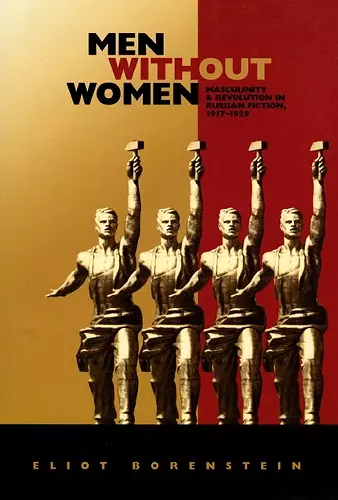Men without Women
Masculinity and Revolution in Russian Fiction, 1917–1929
Format:Hardback
Publisher:Duke University Press
Published:24th Jan '01
Currently unavailable, and unfortunately no date known when it will be back

An analysis of the construction of masculinity in early Soviet culture that finds in the novels of Babel and others an utopian society composed exclusively of men.
Examines the literature of the early Soviet period to shed new light on the iconic Russian concept of comradeship. By analysing a variety of Russian writers who span the ideological spectrum, this title provides an illuminating reading of the construction of masculinity in Soviet culture.In Men without Women Eliot Borenstein examines the literature of the early Soviet period to shed new light on the iconic Russian concept of comradeship. By analyzing a variety of Russian writers who span the ideological spectrum, Borenstein provides an illuminating reading of the construction of masculinity in Soviet culture. In each example he identifies the replacement of blood ties with ideology and the creation of a social order in which the family has been supplanted by the collective.
In such works as Red Cavalry by Isaac Babel, Envy by Yuri Olesha, and Chevengur by Andrei Platonov women are either absent or transformed into bodiless abstractions. Their absence, claims Borenstein, reflects the masculine values that are hallmarks of the post-revolutionary era: production rather than reproduction, participation in history rather than domestic ahistoricity, heavy industry, construction, and struggle. He identifies in this literature groups of “men without women” replacing the family, even while the metaphor of family is used as an organizing feature of their recurring revolutionary missions. With the passage of time, these characters’ relationships—just as those in the Soviet culture of the time—begin to resemble the family structure that was originally rejected and destroyed, with one important exception: the new “families” had no place for women. According to Borenstein, this masculinist myth found its most congenial audience during the early period of communism, but its hostility to women and family ties could not survive into the Stalinist era when women, home, and family were no longer seen as antithetical to socialism.
Drawing on the theory and writings of Levi-Strauss, Girard, Sedgwick, and others, Men Without Women will be of interest to students and scholars of Slavic literature and history as well as specialists in literary theory and gender studies.
“Teeming with insights, tightly argued, and written with stylish verve, MEN WITHOUT WOMEN is a splendid study of three key figures in the context of early Soviet prose: Platonov, Babel, and Olesha. By taking gender into meaningful account Borenstein deftly constructs a nuanced and original perspective, nicely grounded in the era’s history and ideology, from which to read Russian fiction and society of the 1920s. In addition to being a ‘must’ for Slavists, this seductive volume abounds in pleasures of the text.”—Helena Goscilo, University of Pittsburgh
“Well versed in theory and thoroughly knowledgeable about Russian political and cultural life, Borenstein provides an excellent contribution to the burgeoning field of gender studies in Russian and Soviet literatures.”—Adele Barker, University of Arizona
ISBN: 9780822325789
Dimensions: unknown
Weight: 907g
368 pages